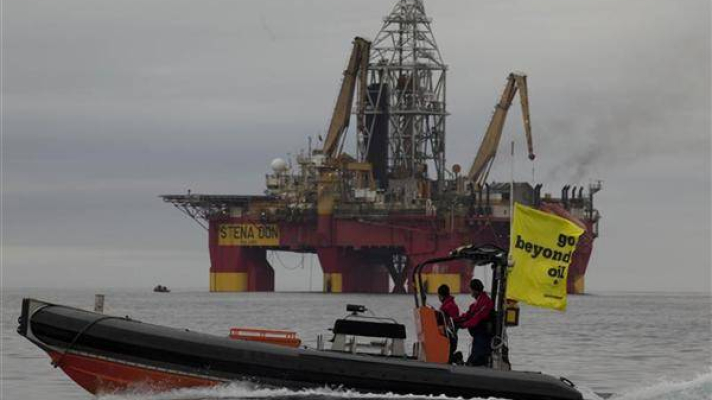How an Arctic oil rush will help suffocate the planet

Can you believe the Esperanza has been in the Arctic for a week now? When we arrived the sea was a mill pond and the sky clear and spectacularwith sunsets that go on for hours, as if they'd never end. What a difference a week makes. Last night the seas tossed us around in our bunks, throwing all it could find to the floor, thwacking everything in cupboards against their sides, like an angry poltergeist. Even the sink was making a sound like a person drowning, emitting a foul stink, whilstthe toilet cisterns overfilled every time the ship lurched starboard. The hardier of us slept four hours at most. At least I now have personalexperience of those dangerously temperamental Arctic weather patterns Ikeep talking about in the media.
Since we arrived we've had good news and bad news. The good news is that BP has been ruled out by Greenland to receive licenses for this area. According to the Guardian, that's partly thanks to the Espy's presence here, which would make it 'political madness' to allow BP to bid. Reading this news to the crew was one of my highlights since arriving onboard, as this confirmed to the crew that what feels like sitting on a ship in the middle of an ocean doing little more than waving at warships is actually meaningful and having direct effect. It definitely helps temper the cabin fever.
The bad news is that Cairn has found gas under the Stena Forth drill ship, which they are trying to spin as being a good sign of findingoil. Hearing this news made us all feel impotent, but the upside is that at least they haven't actually found oil yet. Besides, the next day Cairn's shares dropped considerably so it strikes me that those in the city who know this sort of thing are not at all convinced by Cairn'spropaganda.
If you've seen the news this week, you'll have seen that the debate on Arctic oil exploration has been reignited, which we can chalk up as acampaign success. But still, and perhaps unsurprisingly, the media is often focused on Greenland's right to exploit its resources, rather thanconveying the bigger picture about oil and our future. Of course we aresympathetic to the needs of all governments to provide a stable income for its country and security for its people. But sitting on the bridge of this ship, which we have positioned exactly between the rig and the drill ship, its clear to me that new oil development delivers neither of those things.
I look from one to the other and imagine several hundred more, identical rigs, popping up all over the ocean, right up to the horizon.I think of all the oil being sucked up through the holes that companieslike Cairn have punched in the roof of the world. And I think about allof that oil chugging back to land on tankers and from tankers to refineries, where it joins the oil from the deep wells of Angola, from the tar sands of Canada, from the bloodied wells of Nigeria that have been justification for murder and massacre, from refineries to petrol tanks and from car exhausts into the atmosphere. I think of the emissions knitting themselves around our earth, over the roof of the world, down its sides, underneath, with no holes for a head or an arm, like some kind of hideous Christmas present from a relative that hates us and wants us to die.
We are suffocating our planet with its own innards. This inevitably means both economic and physical instability for all countries. In theend, this means the end of the world. In the meantime it means pain andsuffering for all those who are having weirder weather than they've ever had before, from the floods of Pakistan, to the forest fires of Russia. Yes we are sitting in the Arctic fighting the development of newoil here. But this is a proxy war for the whole planet, a proxy war forthe future.
Don't think we don't know that our three word answers to journalist's questions on 'the alternatives' to oil sound simplistic, sometimes naive, sometimes trite. We are getting three seconds spaces todeliver a symposium of solutions. And frankly we don't have them all! But we do need to have the conversation. And that's why we're here, to get people talking about the global oil problem, not just here in the Arctic.
We're not just saying 'go beyond oil' because it fits on a banner. We're urging world governments to get their heads out of their oil wells and recognise that whoever's oil we are burning we need to start stopping now, because in the end we are all stuck under the one sweater, and its getting really tight.
